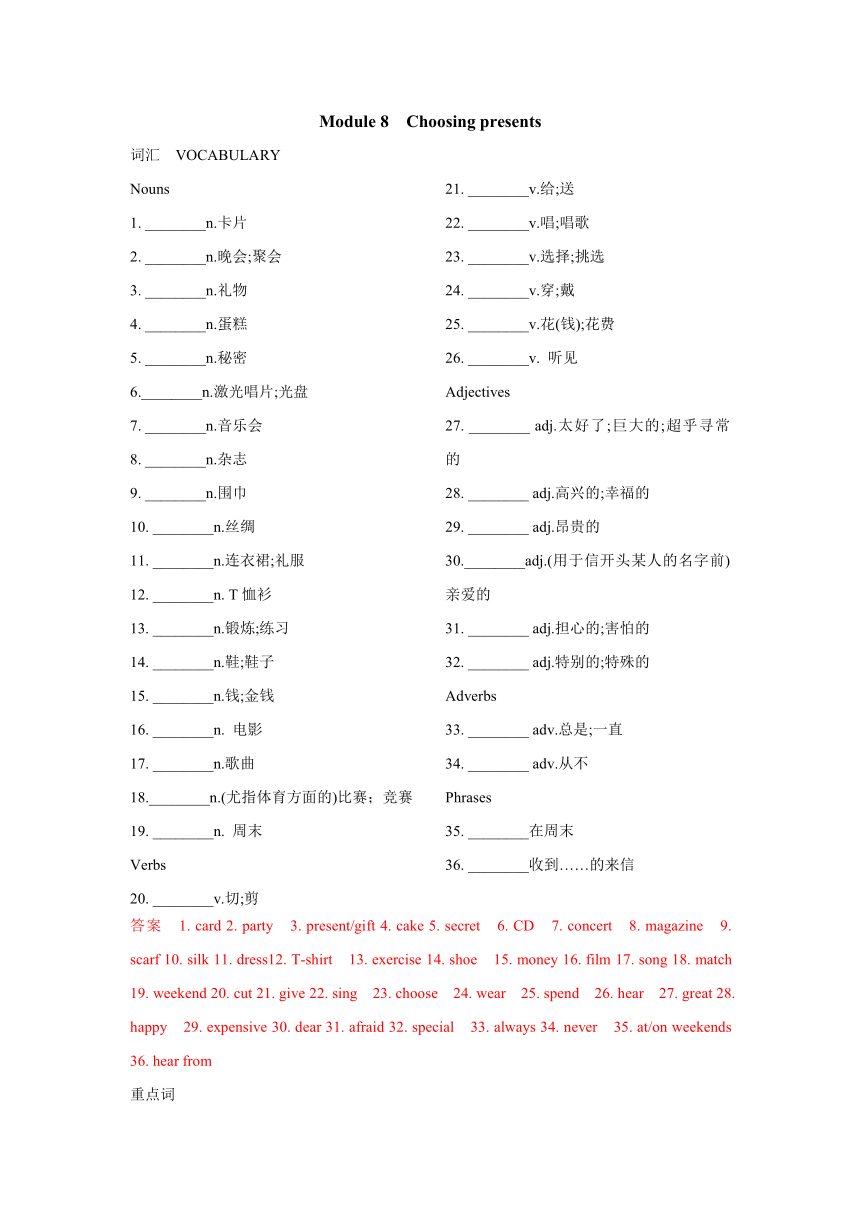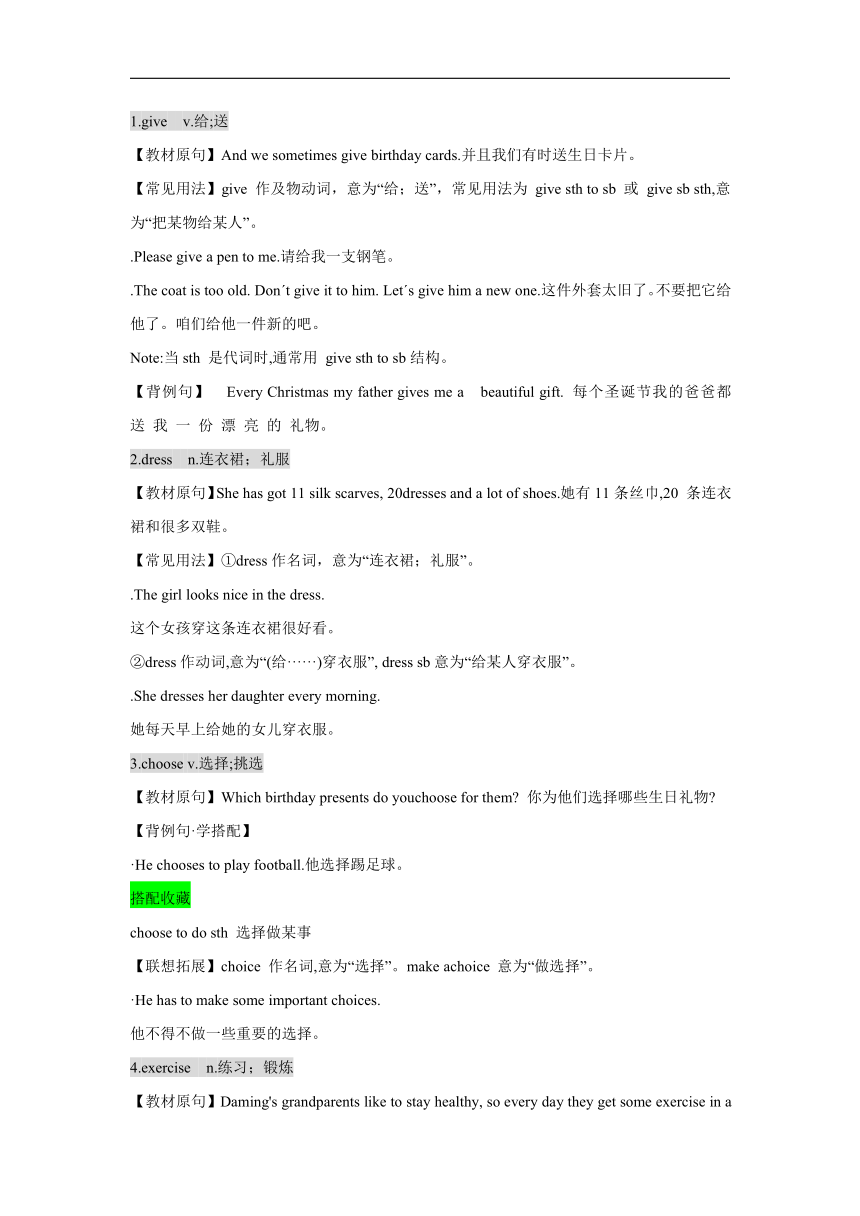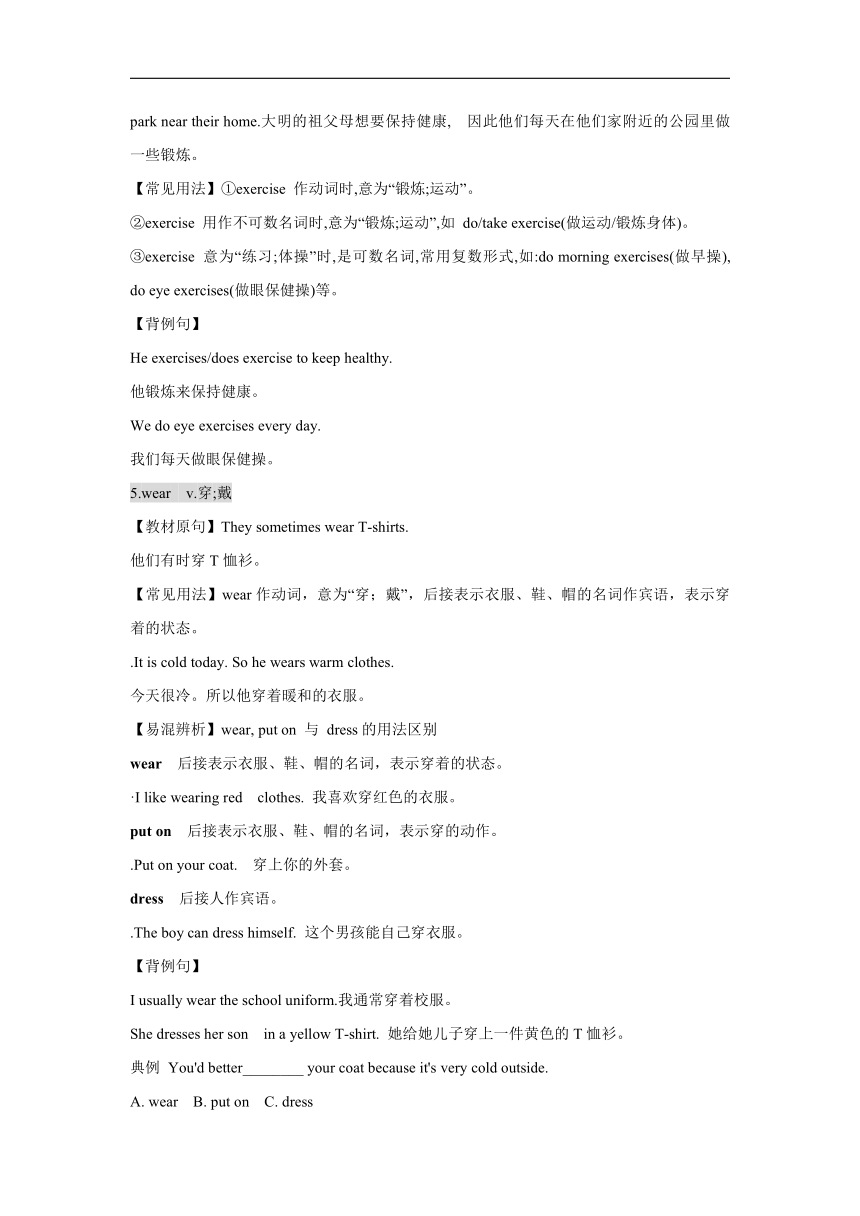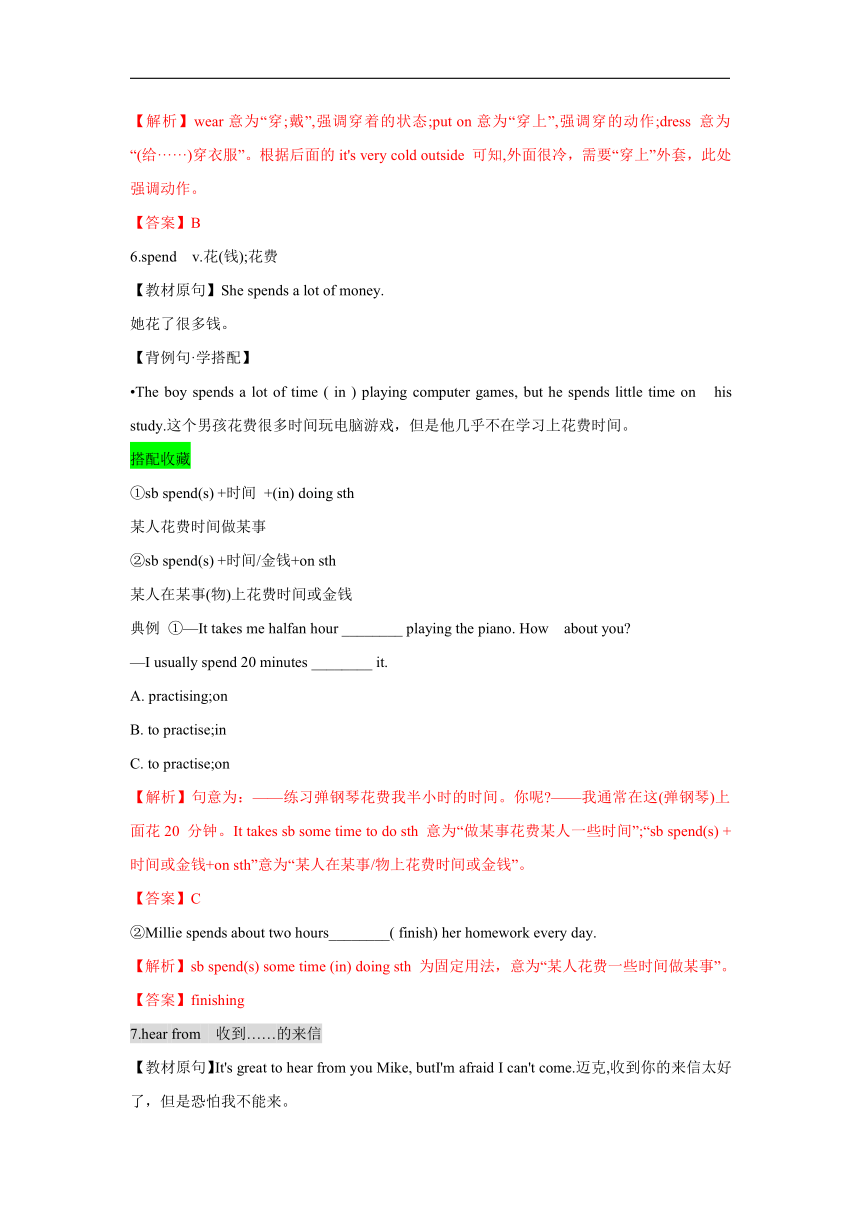Module 8 When is your birthday重点知识讲解+频度副词人教版英语七年级上册
文档属性
| 名称 | Module 8 When is your birthday重点知识讲解+频度副词人教版英语七年级上册 |

|
|
| 格式 | docx | ||
| 文件大小 | 29.0KB | ||
| 资源类型 | 教案 | ||
| 版本资源 | 人教新目标(Go for it)版 | ||
| 科目 | 英语 | ||
| 更新时间 | 2024-06-28 21:39:49 | ||
图片预览




文档简介
Module 8 Choosing presents
词汇 VOCABULARY
Nouns
1. ________n.卡片
2. ________n.晚会;聚会
3. ________n.礼物
4. ________n.蛋糕
5. ________n.秘密
6.________n.激光唱片;光盘
7. ________n.音乐会
8. ________n.杂志
9. ________n.围巾
10. ________n.丝绸
11. ________n.连衣裙;礼服
12. ________n. T恤衫
13. ________n.锻炼;练习
14. ________n.鞋;鞋子
15. ________n.钱;金钱
16. ________n. 电影
17. ________n.歌曲
18.________n.(尤指体育方面的)比赛;竞赛
19. ________n. 周末
Verbs
20. ________v.切;剪
21. ________v.给;送
22. ________v.唱;唱歌
23. ________v.选择;挑选
24. ________v.穿;戴
25. ________v.花(钱);花费
26. ________v. 听见
Adjectives
27. ________ adj.太好了;巨大的;超乎寻常的
28. ________ adj.高兴的;幸福的
29. ________ adj.昂贵的
30.________adj.(用于信开头某人的名字前)亲爱的
31. ________ adj.担心的;害怕的
32. ________ adj.特别的;特殊的
Adverbs
33. ________ adv.总是;一直
34. ________ adv.从不
Phrases
35. ________在周末
36. ________收到……的来信
答案 1. card 2. party 3. present/gift 4. cake 5. secret 6. CD 7. concert 8. magazine 9. scarf 10. silk 11. dress12. T-shirt 13. exercise 14. shoe 15. money 16. film 17. song 18. match 19. weekend 20. cut 21. give 22. sing 23. choose 24. wear 25. spend 26. hear 27. great 28. happy 29. expensive 30. dear 31. afraid 32. special 33. always 34. never 35. at/on weekends 36. hear from
重点词
1.give v.给;送
【教材原句】And we sometimes give birthday cards.并且我们有时送生日卡片。
【常见用法】give 作及物动词,意为“给;送”,常见用法为 give sth to sb 或 give sb sth,意为“把某物给某人”。
.Please give a pen to me.请给我一支钢笔。
.The coat is too old. Don t give it to him. Let s give him a new one.这件外套太旧了。不要把它给他了。咱们给他一件新的吧。
Note:当sth 是代词时,通常用 give sth to sb结构。
【背例句】 Every Christmas my father gives me a beautiful gift. 每个圣诞节我的爸爸都 送 我 一 份 漂 亮 的 礼物。
2.dress n.连衣裙;礼服
【教材原句】She has got 11 silk scarves, 20dresses and a lot of shoes.她有11条丝巾,20 条连衣裙和很多双鞋。
【常见用法】①dress作名词,意为“连衣裙;礼服”。
.The girl looks nice in the dress.
这个女孩穿这条连衣裙很好看。
②dress作动词,意为“(给······)穿衣服”, dress sb意为“给某人穿衣服”。
.She dresses her daughter every morning.
她每天早上给她的女儿穿衣服。
3.choose v.选择;挑选
【教材原句】Which birthday presents do youchoose for them 你为他们选择哪些生日礼物
【背例句·学搭配】
·He chooses to play football.他选择踢足球。
搭配收藏
choose to do sth 选择做某事
【联想拓展】choice 作名词,意为“选择”。make achoice 意为“做选择”。
·He has to make some important choices.
他不得不做一些重要的选择。
4.exercise n.练习;锻炼
【教材原句】Daming's grandparents like to stay healthy, so every day they get some exercise in a park near their home.大明的祖父母想要保持健康, 因此他们每天在他们家附近的公园里做一些锻炼。
【常见用法】①exercise 作动词时,意为“锻炼;运动”。
②exercise 用作不可数名词时,意为“锻炼;运动”,如 do/take exercise(做运动/锻炼身体)。
③exercise 意为“练习;体操”时,是可数名词,常用复数形式,如:do morning exercises(做早操), do eye exercises(做眼保健操)等。
【背例句】
He exercises/does exercise to keep healthy.
他锻炼来保持健康。
We do eye exercises every day.
我们每天做眼保健操。
5.wear v.穿;戴
【教材原句】They sometimes wear T-shirts.
他们有时穿T恤衫。
【常见用法】wear作动词,意为“穿;戴”,后接表示衣服、鞋、帽的名词作宾语,表示穿着的状态。
.It is cold today. So he wears warm clothes.
今天很冷。所以他穿着暖和的衣服。
【易混辨析】wear, put on 与 dress的用法区别
wear 后接表示衣服、鞋、帽的名词,表示穿着的状态。
·I like wearing red clothes. 我喜欢穿红色的衣服。
put on 后接表示衣服、鞋、帽的名词,表示穿的动作。
.Put on your coat. 穿上你的外套。
dress 后接人作宾语。
.The boy can dress himself. 这个男孩能自己穿衣服。
【背例句】
I usually wear the school uniform.我通常穿着校服。
She dresses her son in a yellow T-shirt. 她给她儿子穿上一件黄色的T恤衫。
典例 You'd better________ your coat because it's very cold outside.
A. wear B. put on C. dress
【解析】wear意为“穿;戴”,强调穿着的状态;put on意为“穿上”,强调穿的动作;dress 意为“(给······)穿衣服”。根据后面的it's very cold outside 可知,外面很冷,需要“穿上”外套,此处强调动作。
【答案】B
6.spend v.花(钱);花费
【教材原句】She spends a lot of money.
她花了很多钱。
【背例句·学搭配】
The boy spends a lot of time ( in ) playing computer games, but he spends little time on his study.这个男孩花费很多时间玩电脑游戏,但是他几乎不在学习上花费时间。
搭配收藏
①sb spend(s) +时间 +(in) doing sth
某人花费时间做某事
②sb spend(s) +时间/金钱+on sth
某人在某事(物)上花费时间或金钱
典例 ①—It takes me halfan hour ________ playing the piano. How about you
—I usually spend 20 minutes ________ it.
A. practising;on
B. to practise;in
C. to practise;on
【解析】句意为:——练习弹钢琴花费我半小时的时间。你呢 ——我通常在这(弹钢琴)上面花20 分钟。It takes sb some time to do sth 意为“做某事花费某人一些时间”;“sb spend(s) +时间或金钱+on sth”意为“某人在某事/物上花费时间或金钱”。
【答案】C
②Millie spends about two hours________( finish) her homework every day.
【解析】sb spend(s) some time (in) doing sth 为固定用法,意为“某人花费一些时间做某事”。
【答案】finishing
7.hear from 收到……的来信
【教材原句】It's great to hear from you Mike, butI'm afraid I can't come.迈克,收到你的来信太好了,但是恐怕我不能来。
【背例句·学搭配】
.I have never heard of the place.
我从来没听说过这个地方。
搭配收藏
hear of sb/sth 听说某人/某事/某物
Note:write to sb 表示“给某人写信”。
【背例句】
I write to my friend every month.我每个月都给我的朋友写信。
I hear from my friends.我收到了我朋 (友们的来信。
8.afraid adj.担心的;害怕的
【教材原句】It's great to hear from you Mike, but I'm afraid I can't come.迈克,收到你的来信太好了,但是恐怕我不能来。
【背例句·学搭配】
.She is afraid that the other kids would laugh at her.她担心其他孩子会嘲笑她。
·He is afraid of snakes.他害怕蛇。
.I am afraid to go out alone at night.
我害怕晚上独自外出。
搭配收藏
①be afraid +that 从句 担心……
②be afraid of sth 害怕某事/某物
③be afraid to do sth 害怕做某事
【背例句】 The boy is afraid of the doctor. 这个男孩害怕医生。
句式 SENTENCES
一、“Would you like… ”句型
【教材原句】—Hi, would you like to come to my birthday party 嗨,你想要来参加我的生日聚会吗 ----Yes,I'd love to.是的,我想去。
【句式结构】①“Would you like… ”意为“你(们)想要 吗 ”其表示向对方提出客气的、有礼貌的请求、邀请或询问等。其肯定回答一般为“Yes,please.”,表示“好的,谢谢。”否定回答一般为“No, thanks./No, thank you.”,表示“不用了,谢谢。”
·—Would you like some tea
你想要些茶吗
—Yes, please.好的,谢谢。
②“Would you like to do sth ”意为“你想要做某事吗 ”其表示委婉地提出建议。其肯定回答常用“Yes,I'd love/like to.”; 否 定 回 答 常 用“I'd love to, but…”。
·—Would you like to go shopping with me
你想和我去购物吗
—I'd love to, but I have to look after my sister.
我想去,但是我得照顾我的妹妹。
③would like sb to do sth意为“想要某人做某事”。
·I'd like you to help me with my English.
我想让你帮助我学英语。
典例 ①—Would you like to join me inmaking cakes tomorrow
—________
A. It doesn't matter. B. Don't worry.
C. You're welcome. D. I'd love to.
【解析】句意为:——明天你想和我一起制作蛋糕吗 ——我想去。“Would you like to… ”为提出请求或邀请的固定句型,其肯定回答常为“Yes, I'd loveto.”,否定回答常为“I'd love to, but...”。结合所给选项,故选 D 项。
【答案】D
②—Would you like something toeat
—________ I've had enough.
A. Yes, I would.
B. Yes, please.
C. No,I wouldn't.
D. No, thanks.
【解析】句意为:——你想吃点东西吗 ——不,谢谢。我已经饱了。根据空后的“I've had enough.”可知,设空处应作否定回答。固定句型“Would you like… ”的否定回答常用“No, thanks./No, thank you.”。
【答案】D
③—Would you like to go to themovies with me this Sunday
—________. I'll be free that day.
A. Sorry, I can't
B. Yes,I do
C. Yes, I'd love to
D. No, I wouldn't
【解析】句意为:——这个星期天你想和我一起去看电影吗 ——是的,我愿意。我那天有空。问句提出周日去看电影的建议,由后文中的“I'll be free thatday.”可知此处应作肯定回答;结合选项,故选 C 项。
【答案】C
二、选择疑问句
【教材原句】Do you sing it in Chinese or in English 你们用中文还是英文唱它(生日快乐歌)
【句式结构】选择疑问句常以一般疑问句或特殊疑问句为基础,用or连接两个或多个并列成分。选择疑问句不能用 yes或no回答,而应在所给的选择对象中选择一个作答。
·—Is your brother a teacher or a doctor
你的哥哥是老师还是医生
—A doctor.医生。
典例 —Is the mobile phone newor old
—________. I bought it only two days ago.
A. It's old B. It's new
C. Yes, it is D. No, it isn't
【解析】句意为:——这部手机是新的还是旧的 ——它是新的。我两天前才买的。根据问句中的 Is和or可知问句为选择疑问句,不能用 yes或no来回答,故排除 C、D 两项;结合答语中“I bought it only two days ago.”可知这部手机是新的。故选 B 项。
【答案】B
语法 GRAMMAR
频度副词
【教材原句】①I always like birthday parties.
我总是喜欢生日聚会。
②But my mother never makes a birthday cake.
但是我的妈妈从不做生日蛋糕。
③She usually buys a special one and I cut it at the party.她通常买一个特殊的蛋糕,然后我在(生日)聚会上切开它。
④And we sometimes give birthday cards.
我们有时送生日卡片。
(1)常用的频度副词有:always(总是), usually(通常), often(经常), sometimes(有时), seldom(很少), never(从不)等。
(2)频度副词通常与一般现在时连用。
·He always goes to school on foot.
他总是步行去上学。
(3)频度副词一般放在行为动词的前面,be 动词、情态动词和助动词的后面。
·We usually play football after school.
我们通常放学后踢足球。
(4)对频度副词提问应用 how often,意为“多久一次”。
·—How often do you go to the zoo
你多久去一次动物园
—Sometimes.有时。
典例 ①We'll have to say goodbye,my dear friends! But I will ________ forget the days we spent together.
A. always B. often
C. never D. usually
【解析】句意为:我亲爱的朋友们,我们将不得不说再见了。但是我永远都不会忘记我们一起度过的日子。always 意为“总是;一直”; often 意为“经常”;never 意为“从不”;usually 意为“通常”。根据语境可知选C 项。
【答案】C
②—________ do you stay up
—Never. I always go to bed early.
A. How long B. How often
C. How soon D. How much
词汇 VOCABULARY
Nouns
1. ________n.卡片
2. ________n.晚会;聚会
3. ________n.礼物
4. ________n.蛋糕
5. ________n.秘密
6.________n.激光唱片;光盘
7. ________n.音乐会
8. ________n.杂志
9. ________n.围巾
10. ________n.丝绸
11. ________n.连衣裙;礼服
12. ________n. T恤衫
13. ________n.锻炼;练习
14. ________n.鞋;鞋子
15. ________n.钱;金钱
16. ________n. 电影
17. ________n.歌曲
18.________n.(尤指体育方面的)比赛;竞赛
19. ________n. 周末
Verbs
20. ________v.切;剪
21. ________v.给;送
22. ________v.唱;唱歌
23. ________v.选择;挑选
24. ________v.穿;戴
25. ________v.花(钱);花费
26. ________v. 听见
Adjectives
27. ________ adj.太好了;巨大的;超乎寻常的
28. ________ adj.高兴的;幸福的
29. ________ adj.昂贵的
30.________adj.(用于信开头某人的名字前)亲爱的
31. ________ adj.担心的;害怕的
32. ________ adj.特别的;特殊的
Adverbs
33. ________ adv.总是;一直
34. ________ adv.从不
Phrases
35. ________在周末
36. ________收到……的来信
答案 1. card 2. party 3. present/gift 4. cake 5. secret 6. CD 7. concert 8. magazine 9. scarf 10. silk 11. dress12. T-shirt 13. exercise 14. shoe 15. money 16. film 17. song 18. match 19. weekend 20. cut 21. give 22. sing 23. choose 24. wear 25. spend 26. hear 27. great 28. happy 29. expensive 30. dear 31. afraid 32. special 33. always 34. never 35. at/on weekends 36. hear from
重点词
1.give v.给;送
【教材原句】And we sometimes give birthday cards.并且我们有时送生日卡片。
【常见用法】give 作及物动词,意为“给;送”,常见用法为 give sth to sb 或 give sb sth,意为“把某物给某人”。
.Please give a pen to me.请给我一支钢笔。
.The coat is too old. Don t give it to him. Let s give him a new one.这件外套太旧了。不要把它给他了。咱们给他一件新的吧。
Note:当sth 是代词时,通常用 give sth to sb结构。
【背例句】 Every Christmas my father gives me a beautiful gift. 每个圣诞节我的爸爸都 送 我 一 份 漂 亮 的 礼物。
2.dress n.连衣裙;礼服
【教材原句】She has got 11 silk scarves, 20dresses and a lot of shoes.她有11条丝巾,20 条连衣裙和很多双鞋。
【常见用法】①dress作名词,意为“连衣裙;礼服”。
.The girl looks nice in the dress.
这个女孩穿这条连衣裙很好看。
②dress作动词,意为“(给······)穿衣服”, dress sb意为“给某人穿衣服”。
.She dresses her daughter every morning.
她每天早上给她的女儿穿衣服。
3.choose v.选择;挑选
【教材原句】Which birthday presents do youchoose for them 你为他们选择哪些生日礼物
【背例句·学搭配】
·He chooses to play football.他选择踢足球。
搭配收藏
choose to do sth 选择做某事
【联想拓展】choice 作名词,意为“选择”。make achoice 意为“做选择”。
·He has to make some important choices.
他不得不做一些重要的选择。
4.exercise n.练习;锻炼
【教材原句】Daming's grandparents like to stay healthy, so every day they get some exercise in a park near their home.大明的祖父母想要保持健康, 因此他们每天在他们家附近的公园里做一些锻炼。
【常见用法】①exercise 作动词时,意为“锻炼;运动”。
②exercise 用作不可数名词时,意为“锻炼;运动”,如 do/take exercise(做运动/锻炼身体)。
③exercise 意为“练习;体操”时,是可数名词,常用复数形式,如:do morning exercises(做早操), do eye exercises(做眼保健操)等。
【背例句】
He exercises/does exercise to keep healthy.
他锻炼来保持健康。
We do eye exercises every day.
我们每天做眼保健操。
5.wear v.穿;戴
【教材原句】They sometimes wear T-shirts.
他们有时穿T恤衫。
【常见用法】wear作动词,意为“穿;戴”,后接表示衣服、鞋、帽的名词作宾语,表示穿着的状态。
.It is cold today. So he wears warm clothes.
今天很冷。所以他穿着暖和的衣服。
【易混辨析】wear, put on 与 dress的用法区别
wear 后接表示衣服、鞋、帽的名词,表示穿着的状态。
·I like wearing red clothes. 我喜欢穿红色的衣服。
put on 后接表示衣服、鞋、帽的名词,表示穿的动作。
.Put on your coat. 穿上你的外套。
dress 后接人作宾语。
.The boy can dress himself. 这个男孩能自己穿衣服。
【背例句】
I usually wear the school uniform.我通常穿着校服。
She dresses her son in a yellow T-shirt. 她给她儿子穿上一件黄色的T恤衫。
典例 You'd better________ your coat because it's very cold outside.
A. wear B. put on C. dress
【解析】wear意为“穿;戴”,强调穿着的状态;put on意为“穿上”,强调穿的动作;dress 意为“(给······)穿衣服”。根据后面的it's very cold outside 可知,外面很冷,需要“穿上”外套,此处强调动作。
【答案】B
6.spend v.花(钱);花费
【教材原句】She spends a lot of money.
她花了很多钱。
【背例句·学搭配】
The boy spends a lot of time ( in ) playing computer games, but he spends little time on his study.这个男孩花费很多时间玩电脑游戏,但是他几乎不在学习上花费时间。
搭配收藏
①sb spend(s) +时间 +(in) doing sth
某人花费时间做某事
②sb spend(s) +时间/金钱+on sth
某人在某事(物)上花费时间或金钱
典例 ①—It takes me halfan hour ________ playing the piano. How about you
—I usually spend 20 minutes ________ it.
A. practising;on
B. to practise;in
C. to practise;on
【解析】句意为:——练习弹钢琴花费我半小时的时间。你呢 ——我通常在这(弹钢琴)上面花20 分钟。It takes sb some time to do sth 意为“做某事花费某人一些时间”;“sb spend(s) +时间或金钱+on sth”意为“某人在某事/物上花费时间或金钱”。
【答案】C
②Millie spends about two hours________( finish) her homework every day.
【解析】sb spend(s) some time (in) doing sth 为固定用法,意为“某人花费一些时间做某事”。
【答案】finishing
7.hear from 收到……的来信
【教材原句】It's great to hear from you Mike, butI'm afraid I can't come.迈克,收到你的来信太好了,但是恐怕我不能来。
【背例句·学搭配】
.I have never heard of the place.
我从来没听说过这个地方。
搭配收藏
hear of sb/sth 听说某人/某事/某物
Note:write to sb 表示“给某人写信”。
【背例句】
I write to my friend every month.我每个月都给我的朋友写信。
I hear from my friends.我收到了我朋 (友们的来信。
8.afraid adj.担心的;害怕的
【教材原句】It's great to hear from you Mike, but I'm afraid I can't come.迈克,收到你的来信太好了,但是恐怕我不能来。
【背例句·学搭配】
.She is afraid that the other kids would laugh at her.她担心其他孩子会嘲笑她。
·He is afraid of snakes.他害怕蛇。
.I am afraid to go out alone at night.
我害怕晚上独自外出。
搭配收藏
①be afraid +that 从句 担心……
②be afraid of sth 害怕某事/某物
③be afraid to do sth 害怕做某事
【背例句】 The boy is afraid of the doctor. 这个男孩害怕医生。
句式 SENTENCES
一、“Would you like… ”句型
【教材原句】—Hi, would you like to come to my birthday party 嗨,你想要来参加我的生日聚会吗 ----Yes,I'd love to.是的,我想去。
【句式结构】①“Would you like… ”意为“你(们)想要 吗 ”其表示向对方提出客气的、有礼貌的请求、邀请或询问等。其肯定回答一般为“Yes,please.”,表示“好的,谢谢。”否定回答一般为“No, thanks./No, thank you.”,表示“不用了,谢谢。”
·—Would you like some tea
你想要些茶吗
—Yes, please.好的,谢谢。
②“Would you like to do sth ”意为“你想要做某事吗 ”其表示委婉地提出建议。其肯定回答常用“Yes,I'd love/like to.”; 否 定 回 答 常 用“I'd love to, but…”。
·—Would you like to go shopping with me
你想和我去购物吗
—I'd love to, but I have to look after my sister.
我想去,但是我得照顾我的妹妹。
③would like sb to do sth意为“想要某人做某事”。
·I'd like you to help me with my English.
我想让你帮助我学英语。
典例 ①—Would you like to join me inmaking cakes tomorrow
—________
A. It doesn't matter. B. Don't worry.
C. You're welcome. D. I'd love to.
【解析】句意为:——明天你想和我一起制作蛋糕吗 ——我想去。“Would you like to… ”为提出请求或邀请的固定句型,其肯定回答常为“Yes, I'd loveto.”,否定回答常为“I'd love to, but...”。结合所给选项,故选 D 项。
【答案】D
②—Would you like something toeat
—________ I've had enough.
A. Yes, I would.
B. Yes, please.
C. No,I wouldn't.
D. No, thanks.
【解析】句意为:——你想吃点东西吗 ——不,谢谢。我已经饱了。根据空后的“I've had enough.”可知,设空处应作否定回答。固定句型“Would you like… ”的否定回答常用“No, thanks./No, thank you.”。
【答案】D
③—Would you like to go to themovies with me this Sunday
—________. I'll be free that day.
A. Sorry, I can't
B. Yes,I do
C. Yes, I'd love to
D. No, I wouldn't
【解析】句意为:——这个星期天你想和我一起去看电影吗 ——是的,我愿意。我那天有空。问句提出周日去看电影的建议,由后文中的“I'll be free thatday.”可知此处应作肯定回答;结合选项,故选 C 项。
【答案】C
二、选择疑问句
【教材原句】Do you sing it in Chinese or in English 你们用中文还是英文唱它(生日快乐歌)
【句式结构】选择疑问句常以一般疑问句或特殊疑问句为基础,用or连接两个或多个并列成分。选择疑问句不能用 yes或no回答,而应在所给的选择对象中选择一个作答。
·—Is your brother a teacher or a doctor
你的哥哥是老师还是医生
—A doctor.医生。
典例 —Is the mobile phone newor old
—________. I bought it only two days ago.
A. It's old B. It's new
C. Yes, it is D. No, it isn't
【解析】句意为:——这部手机是新的还是旧的 ——它是新的。我两天前才买的。根据问句中的 Is和or可知问句为选择疑问句,不能用 yes或no来回答,故排除 C、D 两项;结合答语中“I bought it only two days ago.”可知这部手机是新的。故选 B 项。
【答案】B
语法 GRAMMAR
频度副词
【教材原句】①I always like birthday parties.
我总是喜欢生日聚会。
②But my mother never makes a birthday cake.
但是我的妈妈从不做生日蛋糕。
③She usually buys a special one and I cut it at the party.她通常买一个特殊的蛋糕,然后我在(生日)聚会上切开它。
④And we sometimes give birthday cards.
我们有时送生日卡片。
(1)常用的频度副词有:always(总是), usually(通常), often(经常), sometimes(有时), seldom(很少), never(从不)等。
(2)频度副词通常与一般现在时连用。
·He always goes to school on foot.
他总是步行去上学。
(3)频度副词一般放在行为动词的前面,be 动词、情态动词和助动词的后面。
·We usually play football after school.
我们通常放学后踢足球。
(4)对频度副词提问应用 how often,意为“多久一次”。
·—How often do you go to the zoo
你多久去一次动物园
—Sometimes.有时。
典例 ①We'll have to say goodbye,my dear friends! But I will ________ forget the days we spent together.
A. always B. often
C. never D. usually
【解析】句意为:我亲爱的朋友们,我们将不得不说再见了。但是我永远都不会忘记我们一起度过的日子。always 意为“总是;一直”; often 意为“经常”;never 意为“从不”;usually 意为“通常”。根据语境可知选C 项。
【答案】C
②—________ do you stay up
—Never. I always go to bed early.
A. How long B. How often
C. How soon D. How much
同课章节目录
- starters 预备篇(2012秋审查)
- Unit 1 Good morning !
- Unit 2 What’s this in English?
- Unit 3 What color is it ?
- Unit 1 My name's Gina.
- Section A
- Section B
- Unit 2 This is my sister.
- Section A
- Section B
- Unit 3 Is this your pencil?
- Section A
- Section B
- Unit 4 Where's my schoolbag?
- Section A
- Section B
- Unit 5 Do you have a soccer ball?
- Section A
- Section B
- Unit 6 Do you like bananas?
- Section A
- Section B
- Unit 7 How much are these socks?
- Section A
- Section B
- Unit 8 When is your birthday?
- Section A
- Section B
- Unit 9 My favorite subject is science.
- Section A
- Section B
